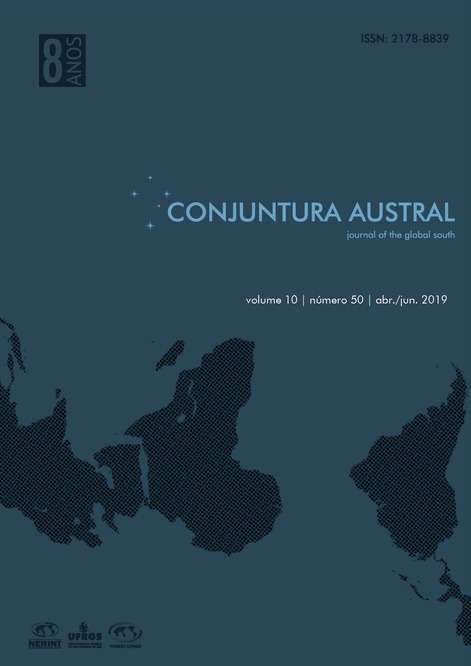Socialist Republic of Vietnam: context, foreign policy and thirty years of relations towards Brazil (1989-2019)
DOI:
https://doi.org/10.22456/2178-8839.89076Keywords:
Foreign policy, Asia, VietnamAbstract
This article’s aim is to introduce a research about the history of relations between Brazil and Vietnam since its establishment in 1989. A PWC’s report (2017) indicated that, in the next three decades, Vietnam will be the country with the highest economic growth (GDP per capita) in the world, registering an average of 5.1% annually. In a context where 4 of the world's 7 largest GDPs will be in Asia (expected for 2050), this growth is significant and deserves attention. Through a bibliographic review of Vietnam's recent history, as well as use of portals from both governments and research reports, it seeks, in a first step, to demonstrate the recent changes that have taken place in the country and then to demonstrate how Vietnamese foreign policy was designed at the end of the 20th century and at the beginning of the 21st century. Finally, the research includes data on official visits, support in multilateral institutions and bilateral trade between Brazil and Vietnam.
Downloads
Downloads
Published
How to Cite
Issue
Section
License
Authors who publish with this journal agree to the following terms:
a. Authors retain the copyright and grant the journal the right to first publication, with the work simultaneously licensed under the Creative Commons Attribution-Non Commercial-ShareAlike 4.0 International License, which allows its use, distribution and reproduction in any medium, as well as its transformation and creations from it, as long as the original author and source are credited. Also, the material cannot be used for commercial purposes, and if it is transformed, or used as a basis for other creations, these must be distributed under the same license as the original.
b. Authors are able to enter into separate, additional contractual arrangements for the non-exclusive distribution of the journal's published version of the work (e.g., post it to an institutional repository or publish it in a book), with an acknowledgment of its initial publication in this journal.
c. Authors are allowed to deposit, in the repositories accepted by Conjuntura Austral, the preprint version of the manuscripts submitted to the journal prior to and during the submission process, as it can lead to productive exchanges, as well as earlier and greater citation of published work (See The Effect of Open Access)
d. Authors are permitted and encouraged to publish and distribute online (in institutional and /or thematic repositories, on their personal pages, etc.) the postprint version of the manuscripts (accepted and published), without an embargo period.
e. Conjuntura Austral: Journal of the Global South, imbued with the spirit of ensuring the protection of regional academic and scientific production in Open Access, is a signatory to the Mexico Declaration on the use of the Creative Commons BY-NC-SA license to guarantee the protection of academic and scientific production in open access.








